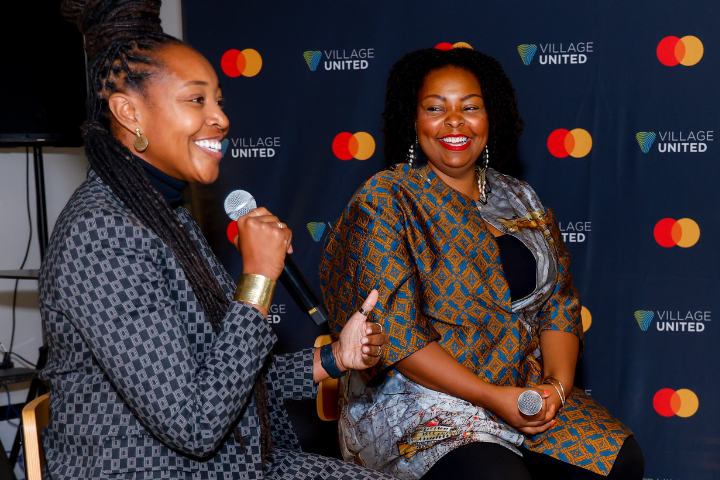Khadijah Ford calls herself the “cookie fairy.” As founder and sole operator of Philadelphia-based Sugarluxe by Babycakes, she makes corporate-branded sugar cookies and custom cookie orders and teaches cookie decorating events for kids and adults.
The U.S. economy relies heavily on people like Ford — “solopreneurs” who hustle every day to operate their one-person businesses. In fact, 82% of the 33 million small businesses in the country are comprised of a single person. Between 1997 and 2019, the total solopreneur business skyrocketed by over 75% to 27.1 million.
Nevertheless, being a lone cookie fairy is isolating. There’s no one to share inside jokes with, no one to pick up extra shifts and no one to consult with on major strategic decisions. And Ford faces additional challenges as a Black business owner. According to McKinsey & Company, Black-owned companies often don’t have networks that can help them grow their businesses and obtain capital. It’s not just the connections. Black entrepreneurs report higher rejection rates for bank loans, and another analysis shows that when they do get approved, it’s for lower amounts and at higher rates.
That’s how Ford found herself at Mastercard’s New York City Tech Hub last week, sharing hugs and laughter with around 20 other entrepreneurs in the Elevate program developed by Atlanta-based nonprofit Our Village United as part of Strive USA, Mastercard’s signature philanthropic small business initiative for North America. It was a reunion of sorts: Ford had met several of the other women at Beyonce’s BeyGood Foundation’s Black Parade Route Small Business Impact Luncheon in August, also supported through Strive USA.
Elevate helps entrepreneurs — many of whom are solopreneurs — through mentoring and coaching, to develop skills in business operations and digital literacy to access knowledge and capital, including access to Mastercards’s Digital Doors platform to accelerate e-commerce and digital payment acceptance and more.
As someone who has joined several incubator and small business education programs previously, Ford says Elevate stands out. “The difference is the community,” she says.
Building community is precisely what Lakeysha “Dr. Key” Hallmon intended when she launched OVU in 2017. “In the African American community, 96% of entrepreneurs are single operators,” Hallmon said. “My end goal was to create a well-resourced village so entrepreneurs could have what I call a nutrient rich community.
“You must see facilitators that look like you, who sat in seats like you, who scaled their businesses to seven-figures,” she continued. Through the program, the participants find support in a new network of entrepreneurs, creating relationships that they say will continue long past the program’s conclusion. For these small business owners, mental wellbeing can be as important a factor for success as financial know-how and marketing savvy, Hallmon says, so the program also partners with licensed mental health practitioners and wellness coaches to reduce burnout and boost resilience.

Our Village United founder Lakeysha “Dr. Key” Hallmon, left, and Salah Goss, senior vice president for the Mastercard Center for Inclusive Growth, at the small business event at Mastercard’s New York City Tech Hub. (Photo credit: Carol Rose)
“Investing in OVU as a Strive USA partner was an easy decision,” says Salah Goss, senior vice president at the Mastercard Center for Inclusive Growth. “OVU’s immersive programming coupled with their proven results in small business revenue growth make OVU a perfect champion for the type of inclusive economic growth Strive USA is designed to foster.”
At the recent event, Ford and the other business owners also had the opportunity to compete for grant money. Five entrepreneurs pitched judges from Mastercard and the City of New York Minority and Women-Owned Business Enterprises for the chance to win up to $25,000.
Ford talked about how before the pandemic, she had decided to focus her baking solely on her highly-decorated cookies which always gave her customers so much joy. But when the pandemic put an end to her in-person cookie decorating parties, she had to pivot and moved into corporate gift giving, customizing cookie decorations around brands.
The judges praised Ford for diversifying her revenue streams, and at the end of the evening, she received the first place prize of $25,000, plus another award for the most new business collaborations of the cohort.
With her earnings, Ford plans to finish her basement workspace renovation and hire additional help, including her mother and a pastry school intern. She also plans to develop better packaging for her DIY cookie kits and other shipping needs.
Ford says the program has helped her with “the clarity of direction I’m going in my business.” Winning the cash prizes was meaningful not only because it will help her further her work, but “the fact that you all support me and think what I do is valuable, this means everything.”
Banner photo: “Cookie fairy” Khadijah Ford, wand in hand, pitching her custom cookie business to small business experts. (Photo credit; Carol Rose)

